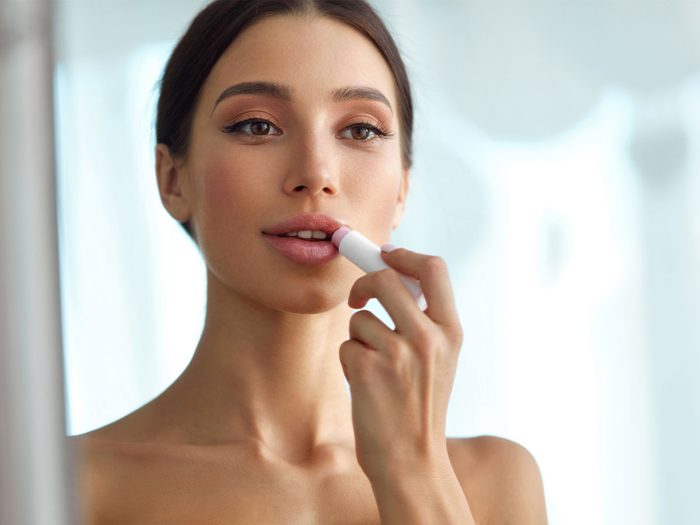
Lip balm
If you’ve ever sat with a friend and watched as he or she applied and then reapplied lip balm repeatedly, there’s a scientific reason for it, according to Samantha Conrad, MD, a dermatologist at Northwestern Memorial HealthCare in Chicago. For starters, the ingredients in some products can end up being super drying, which prompt you to feel the need to keep reapplying in a vicious cycle. “In addition, the feeling of being ‘addicted to lip balm’ is that the person has become very used to a textural feeling on his or her lips,” she says. “When they don’t have the product on, they feel that something is missing.” Check out the 12 things dermatologists do in the winter to keep their skin healthy.
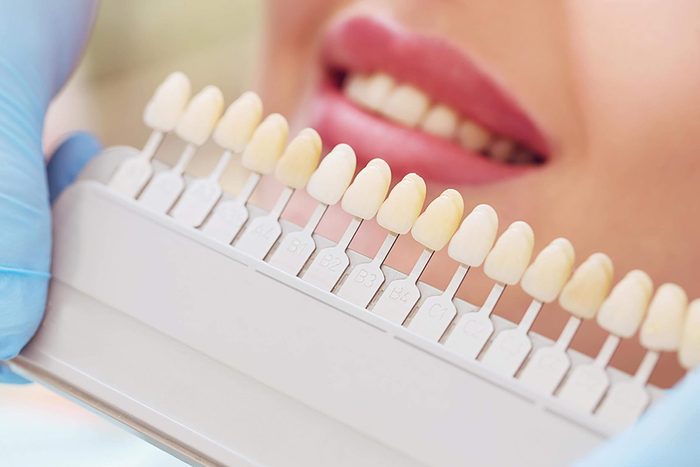
Teeth whitening
It’s one thing to use whitening strips regularly to remove red wine and coffee stains. It’s quite another to be addicted to bleaching your teeth. There’s even a term for it: Bleachorexia refers to being addicted to bleaching teeth, says Leslie Renee Townsend, DDS, of Jefferson Dental Clinics in Dallas, Texas. “Overuse or misuse of whitening products such as lasers, strips, gels, rinses, or pastes can cause noticeable sensitivity, tooth pain, gum irritation, and weakened enamel, often temporary, but sometimes more permanent,” Dr. Townsend says. “At worst, teeth begin to demineralize with time, since whitening products strip tooth enamel resulting in transparent-looking teeth.” Here are some more ways to keep your smile in tip-top shape.
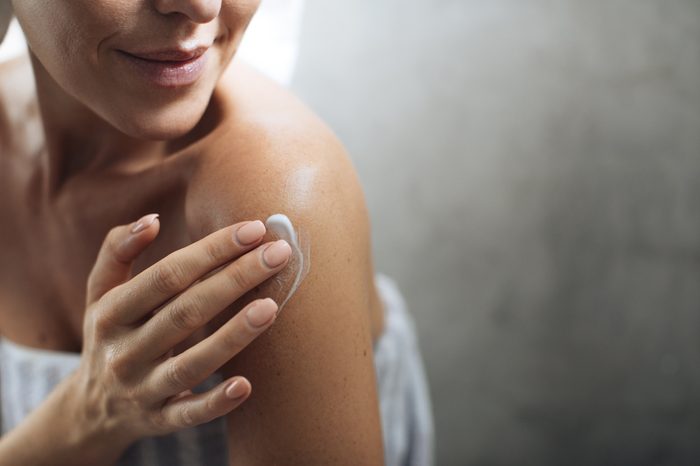
Moisturizer
If you tend to moisturize more than twice a day, quit it. Turns out, what you’re doing is actually counterintuitive and may make your skin addicted to that product. “There are some theories that constant use of thick moisturizers can make the skin lazy,” says Joshua Zeichner, MD, director of cosmetic and clinical research in the department of dermatology at The Mount Sinai Hospital in New York City. “By providing a false barrier to the environment, the skin does not have to work as hard as it normally would to maintain adequate hydration levels. If you were to quickly take away the moisturizer, your skin might end up dry and inflamed.” In fact, it’s a myth that everyone needs to use a moisturizer. “If you have skin conditions like eczema (Here’s how to prevent a flare-up this winter.) or if you experience dryness, visible scaling or flaking, redness, or itching, a moisturizer can help,” he adds. “However, if your skin looks and feels normal, you do not necessarily need to use a moisturizer regularly.” If you want to use a moisturizer, opt for a breathable product that’s light and easy to spread. “The newest generation of moisturizers use technology that allow you to experience the benefits of traditional ingredients without a greasy, heavy feeling,” Zeichner adds.

Exercise
Exercise addiction is well established in the scientific literature and usually means that your day isn’t complete unless you’ve gotten in a run, hit the gym, or hopped on a bike. “Exercise addicts tend to feel that exercise is the most important thing in their life,” says Rachel Straub, an exercise physiologist in San Diego. “They also use exercise as a coping strategy to control emotions.” How you know you’re an exercise fanatic: “To check in with yourself, consider if you have to continually increase exercising to feel satisfied, or if you experience irritability or depression when you suddenly reduce the exercise you’re getting,” Straub says. Think you’re addicted to exercise? Watch out for these 7 signs.
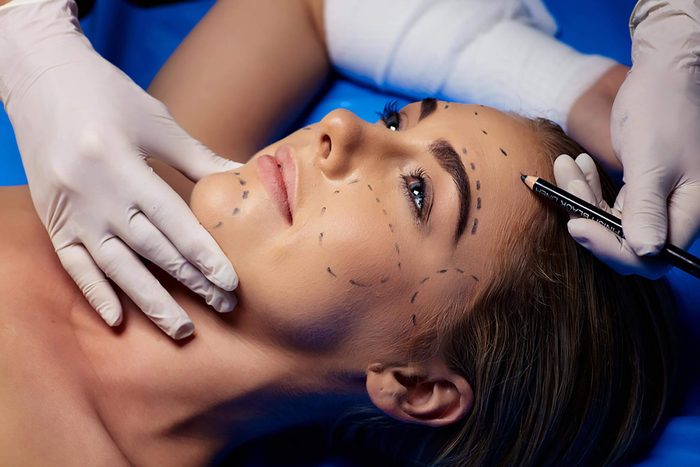
Plastic surgery
Plastic surgery can quickly become an addiction for some. “Patients seeking Botox often start out wanting to look ‘natural,'” says John Layke, MD, a plastic surgeon at Beverly Hills Plastic Surgery Group. “But once they see how Botox smooths out fine lines and relaxes deep furrows, they notice small lines when they make expressions, and they want those gone too. Pretty soon, if the physician lets them, the ‘natural’ look becomes frozen.” Other common “addictions” include facial fillers, especially in the lips and cheeks, and liposuction, adds Dr. Layke. “Procedural ‘addicts’ are usually unaware of their addiction and most often need to be turned away by their plastic surgeon,” he says. “This type of patient literally skips from office to office until someone agrees to give them what they want. It is usually the surgeon or injector who makes the diagnosis of ‘addiction.'” These natural anti-aging masks are plastic surgeon-approved.
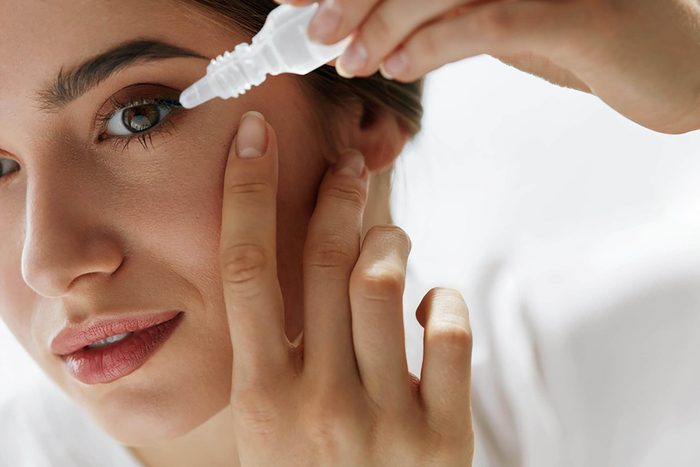
Eye drops
If your eye allergies prompt chronic red eyes and you routinely reach for over-the-counter eye drops, you could get addicted to these drops. Eye drops relieve red eyes thanks to a few active ingredients such as tetrahydrozoline, a vasoconstrictor that constricts the conjunctival blood vessels so that they appear smaller and thus your eyes appear less red. “Some patients may find themselves increasing their frequency of use because of a rebound effect,” says Kelly Voltz, OD, an optometrist at Mosaddegh Eye Institute. “For some percent of the population, extended use of eye drops can cause redness, and patients may find themselves in a cycle of using a product which initially helped the problem but now contributes to it.” Read up on the 10 things you’re doing wrong when it comes to your eyes.
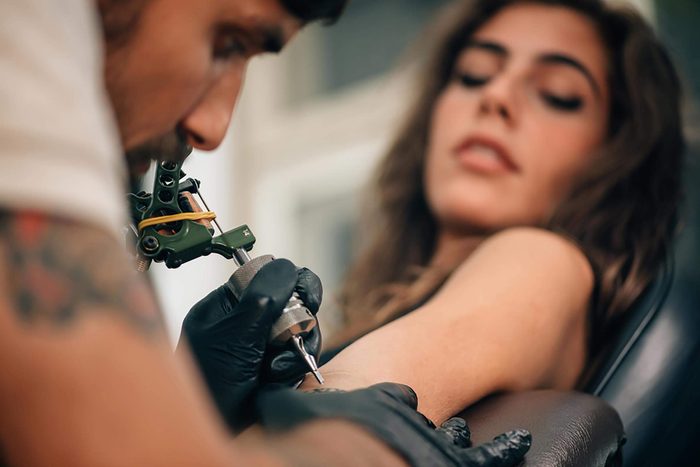
Tattoos
With 45 million Americans said to have at least one tattoo—and of that number, 32 percent say they’re addicted—the question is why. “Addiction is psychosomatic,” says Kirby Farrell, PhD, a professor at the University of Massachusetts at Amherst, who has written frequently about the topic. “How you think about yourself affects your body. If you imagine that tattoos can change people’s perception of you, you can believe that a new image on your skin will impress others, boost your self-esteem, and eliminate the need for more needlework.” At the same time, that new ink may not be enough. “In searching for more images, you may be going around in circles, depressed or angry at yourself and not seeing a new, happier face in the mirror. That can feel—and trap you—like an abused substance.” Learn the best way to take care of your new ink.
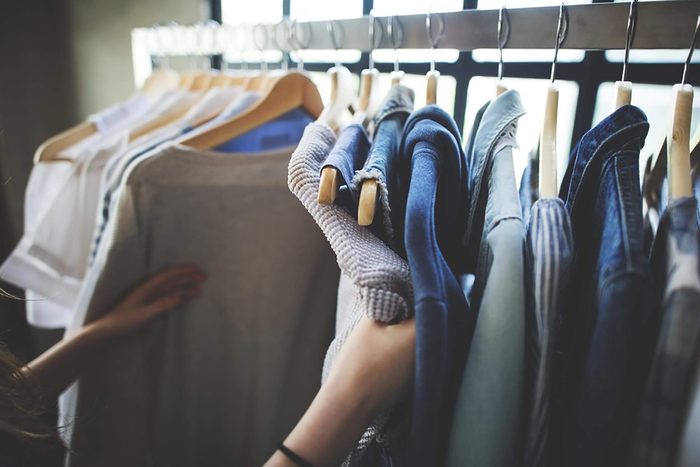
Shopping
If you’re perpetually in need of retail therapy, take note. Turns out there are as many reasons to becoming addicted to shopping as there are shopping addicts, says April Lane Benson, PhD, author To Buy or Not to Buy: Why We Overshop and How to Stop. “Some of the motivators include wanting to feel better about yourself or to feel more secure,” she says. “Shopping can also be a way to soothe oneself, to feel more in control or to fill an internal void.” How do you know if you’re an addict? “You can be pretty sure you are if shopping is your equal opportunity all-purpose mood changer, if you’ve tried to stop and have been unable to, if you’re hiding purchases or bills, and/or if you’re lying about this to yourself and to others,” Benson says. And if some serious shopping is on your radar this holiday season, here’s how to declutter your home before the festivities begin.

Furniture curation
Thanks to social media algorithms that can see exactly how you’re interacting with posts on Instagram and Facebook, there has become an addiction with finding the perfect living room chairs, potted plants, or woven rug to pull a room together to then post online, says Lindsey Pratt, LMHC, a therapist in private practice in New York City who specializes in addiction and recovery. “Targeted ads play off this addiction, and it’s now easier than ever to curate an experience at home to sell to the world rather than living in reality,” she adds. Online shopping can be convenient, but sometimes you need to see furniture in person to make sure it’s worth the investment and realistic for your lifestyle. Looking to live a healthier lifestyle? Find out this nutritionist’s secret.

Listening to music
This is one addiction you won’t need to kick. A study published in the Nature journal Scientific Reports found that listening to enjoyable music creates a natural high. “The body reacts in the same way as when it eats pleasurable food, by releasing the neurotransmitter dopamine,” says Duy Nguyen, DO, a board-certified psychiatrist at Beachway Therapy Center in Boynton Beach, Florida. “It is this chemical that makes us want to repeat behaviours to regain that feeling again, which is why we can become addicted to listening to our favourite songs.” These are the 21 hidden benefits music lovers wish you knew.
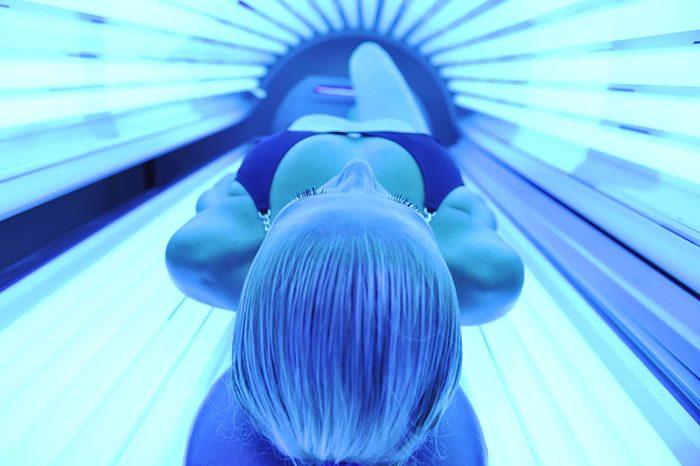
Tanning
Tanning addiction is very common, particularly among young men and women between the ages of 18 and 30. In fact, a study conducted by the Georgetown University Medical Center concluded that one in five young white women who have used a tanning bed in the last year showed signs of dependence, says dermatologist Deborah S. Sarnoff, MD, president of The Skin Cancer Foundation. Just how bad is tanning? More than 460,000 cases of skin cancer in the United States, Europe, and Australia each year are linked to indoor tanning. How do you know if you’re addicted? “There are a few telling signs,” Dr. Sarnoff says. “UV light has been shown to trigger a release of endorphins, the feel-good hormone,” she says. “You might find yourself craving that feeling of happiness. If you find you’re going to the tanning salon more often or staying in the tanning bed longer, that could be a sign of dependence.” Still struggling with your tanning addiction? Try these faux tan options.

Online dating
If it’s as easy to find a date as it is to swipe left or right, it’s easy to see how online dating could be very addictive. “People are addicted to online dating because so many of us have deep-rooted fantasies of finding Mr. or Ms. right who will change, rescue, or drastically improve our lives,” says Isabel James, a matchmaker, relationship coach and the founder of Elite Dating Managers, a site on which many clients report checking for potential matches—and hoping to experience the excitement of finding a new love—over 20 times a day. “We like to believe one person can do this, and the media has lead us to believe so as well. Being in love can be one of the greatest things in life, and dating app addictions trail this desire.” And if you’re newly single, you’ll want to check out this guide for online dating.
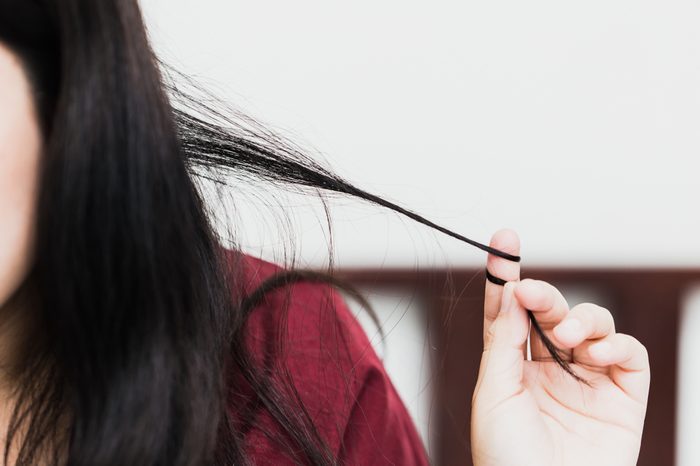
Pulling your hair
The clinical term for this is trichotillomania, and it’s when someone can’t stop twisting or pulling their hair out, says Anna Guanche, MD, FAAD, a board-certified dermatologist and founder of the Bella Skin Institute in Calabasas, California. It doesn’t just stop with the hair on your head, either. Dr. Guanche says some people will pull the hair on their eyebrows or even eyelashes as a compulsive urge or mindless habit, such as when they are zoned out watching TV. These everyday habits are wrecking your hair.
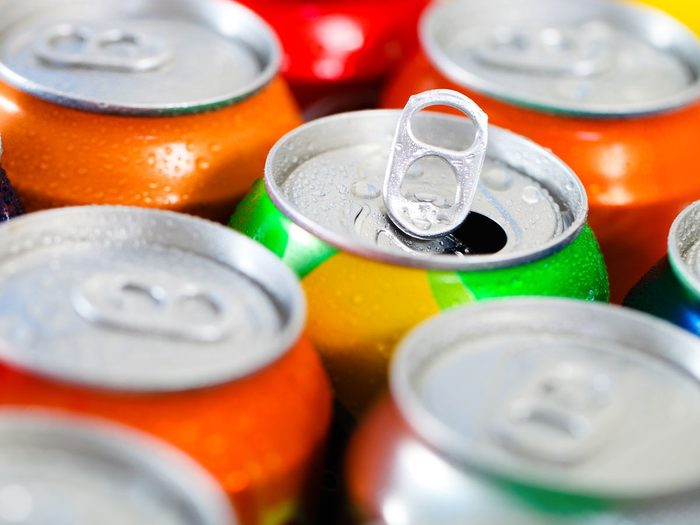
Diet pop
Diet pop can screw up your metabolism, lead to weight gain, and cause numerous health problems from diabetes to high blood pressure. But giving it up can be more difficult than you might think, because it’s possible to be addicted to it. While the addiction may stem from the artificial sugars in diet pop Rev. Sheri Heller, LCSW a licensed clinical social worker and addiction specialist based in New York, says the addiction can also stem from weight control and body dysmorphia. “I’ve worked with [clients] who drink litres of diet pop and can’t seem to stop, even when they incur physical maladies,” she says. Here’s the real reason you’ll never want to drink diet soda again.
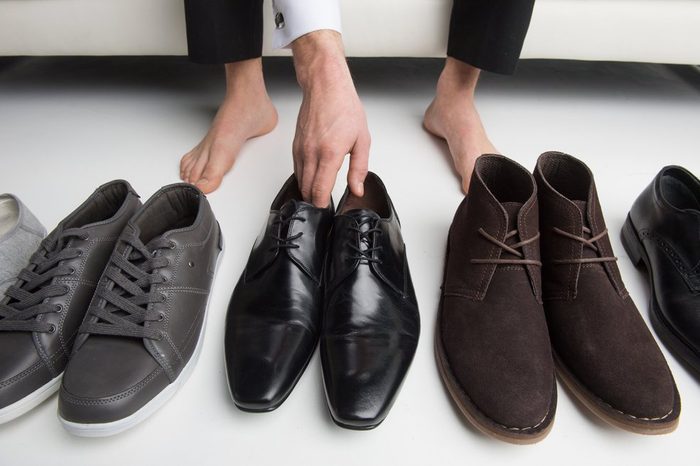
Shoes or designer clothes
This is a fairly common addiction, according to Heller, and while similar to shopping, the focus here is on specific objects that help conceal feelings of inferiority by creating an elite persona. In the case of shoes, it can sometimes be linked to a foot fetish, Heller says, but more often than not excessive shoe buying is being done to fill some other kind of inner void. Still looking for the perfect holiday outfit? These picks easily transition from work to evening party.

Television
Getting caught up binge-watching a show on Netflix is one thing, but if you find yourself parked in front of the TV too often, it could be a sign of a bigger issue. “Nielsen Media Research found that the average American watches four to five hours of television each day,” says Dr. Nguyen. “By the time they reach 65 years old, that would mean they would have spent an astonishing nine years watching television.” Not only can revolving your life around what’s on television cause distorted reality and other behavioural issues, but it also promotes a sedentary lifestyle, setting you up for developing health conditions such as cardiovascular and heart disease, says Dr. Nguyen. Here are 7 facts about heart disease that could save your life.

Taking selfies
Posting selfies on social media, updating your location and checking in to places, and incessantly refreshing your feed for new comments and likes all result in a dopamine hit to your system, Pratt says. A social competition of who is living the best life feeds the addiction to continue the behaviour, she adds. Read more on how social media is actually harming your health.
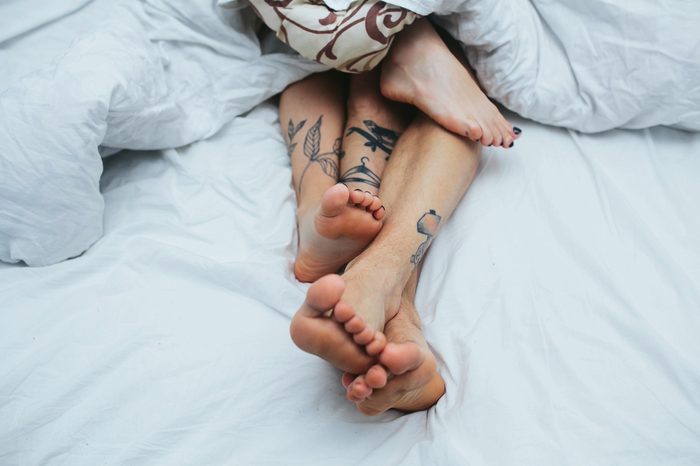
Sex
Whether you enjoy having sex (and therefore feel like you need to have a lot of it) or can’t stop looking at porn, Dr. Nguyen says you may have hypersexual disorder. And while having sex certainly can be good for you, this particular disorder negatively affects your relationships and how you function at work, home, and all other areas of your life. The disorder also means your brain is hardwired similar to someone who has a gambling or drug addiction, Dr. Nguyen says, making it difficult to give up that behaviour. These are the 8 sexual health conditions millennial men aren’t talking about.

Extreme sports
Those who enjoy extreme sports such as rock climbing, snowboarding, mountain biking, and more are often labeled as “adrenaline junkies” because they are addicted to the thrill and feeling of euphoria of doing such activities, Dr. Nguyen says. A study published in the Journal of Behavioral Addictions found that when people don’t do these activities over an extended period, they go through symptoms of withdrawal consistent with addictive behaviours. Find out how one woman is dealing with an exercise addiction.

Being busy
Constantly being busy has started to become culturally acceptable in the United States, particularly in cities and anywhere where there is a level of peer competition, says Pratt. “Being busy can fill the void that is felt when being alone and truly experiencing what it is like to spend time with oneself, [which] is often avoided at a level of addiction,” she says. This notion of feeling like you always have to be busy can often start in the workplace. Here are 15 signs your job is bad for your health.
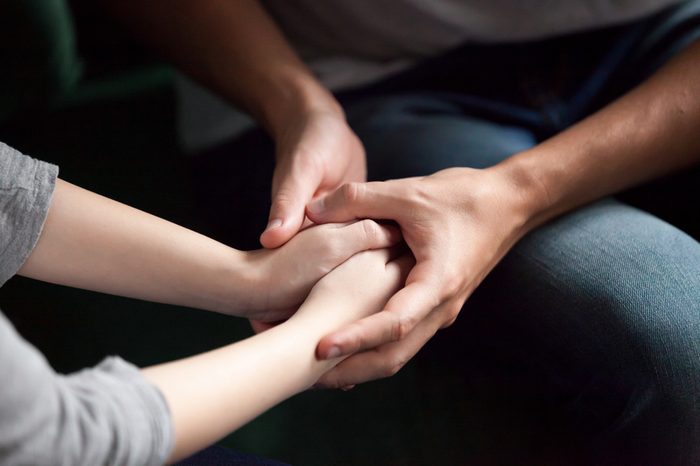
Apologizing
Saying “I’m sorry” for no reason at all or during a situation that’s completely out of your control can be an addiction, says Cindy Shaw, a certified neurolinguistic practitioner and a transformational life and brain health coach. “Unnecessary apologizing is a habit that self-awareness, brain training, and mindfulness can easily aid over time,” Shaw says. Learn how to practice mindfulness during your morning commute.

Negative self-talk
From scrutinizing your weight to anticipating the worst outcome of a situation, negative self-talk can quickly become engrained in a person’s brain from a young age. “For many people, negative self-talk has been so pervasive throughout their lives that it’s just become a habit [similar to an addiction],” Shaw says. “Intentionally monitoring your inner dialogue and replacing overly harsh thoughts with more neutral or positive sentiments will help you break the habit once and for all.” Use these 22 strategies to put a stop to negative self-talk.

Love
Similar to how online dating can lead to never-ending possibilities of finding your soulmate, the romantic feelings of love can be addicting, found a study published in the journal Philosophy, Psychiatry, & Psychology. Researchers discovered behavioural, psychological, and neurophysiological evidence that feelings of love have similar effects to chronic, drug-seeking behaviour and coming down off of these behaviours (i.e. going through a breakup) can lead to feelings of withdrawal for those affected. Here’s your go-to guide for surviving a breakup with your BFF.
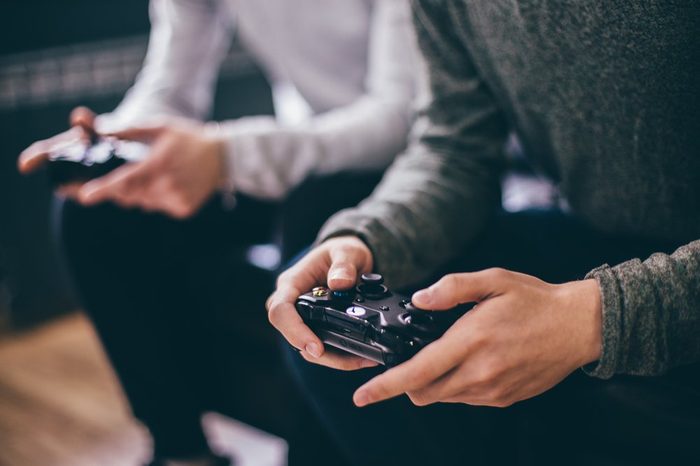
Video games
Dr. Nguyen says the act of winning is addictive in itself, and when you combine that with a virtual world that is completely different and more exciting than your real life, that environment can become extremely addicting. Some signs of a video game addiction include becoming irritable when not playing over an extended period of time, and needing more and more screen time to feel satisfied and content. This relatively new condition has been named gaming disorder by the World Health Organization. (Find out how smartphones can help better manage your health concerns.)
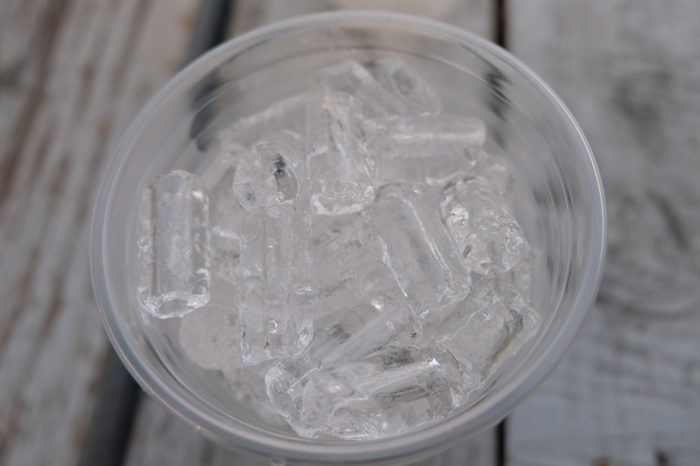
Chewing ice
Called pagophagia, chewing ice is considered a form of pica, a type of eating disorder in which someone feels the need to chew items that have no nutritional value. Ice cravings may be specific to an iron deficiency, as well as a red flag for obsessive-compulsive disorder or another developmental issue. Learn the real reasons why you should treat an “addiction” holistically.
